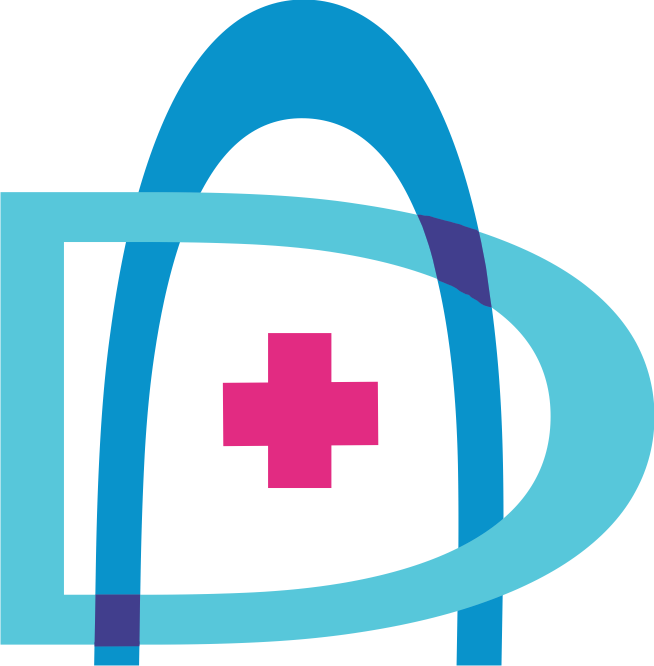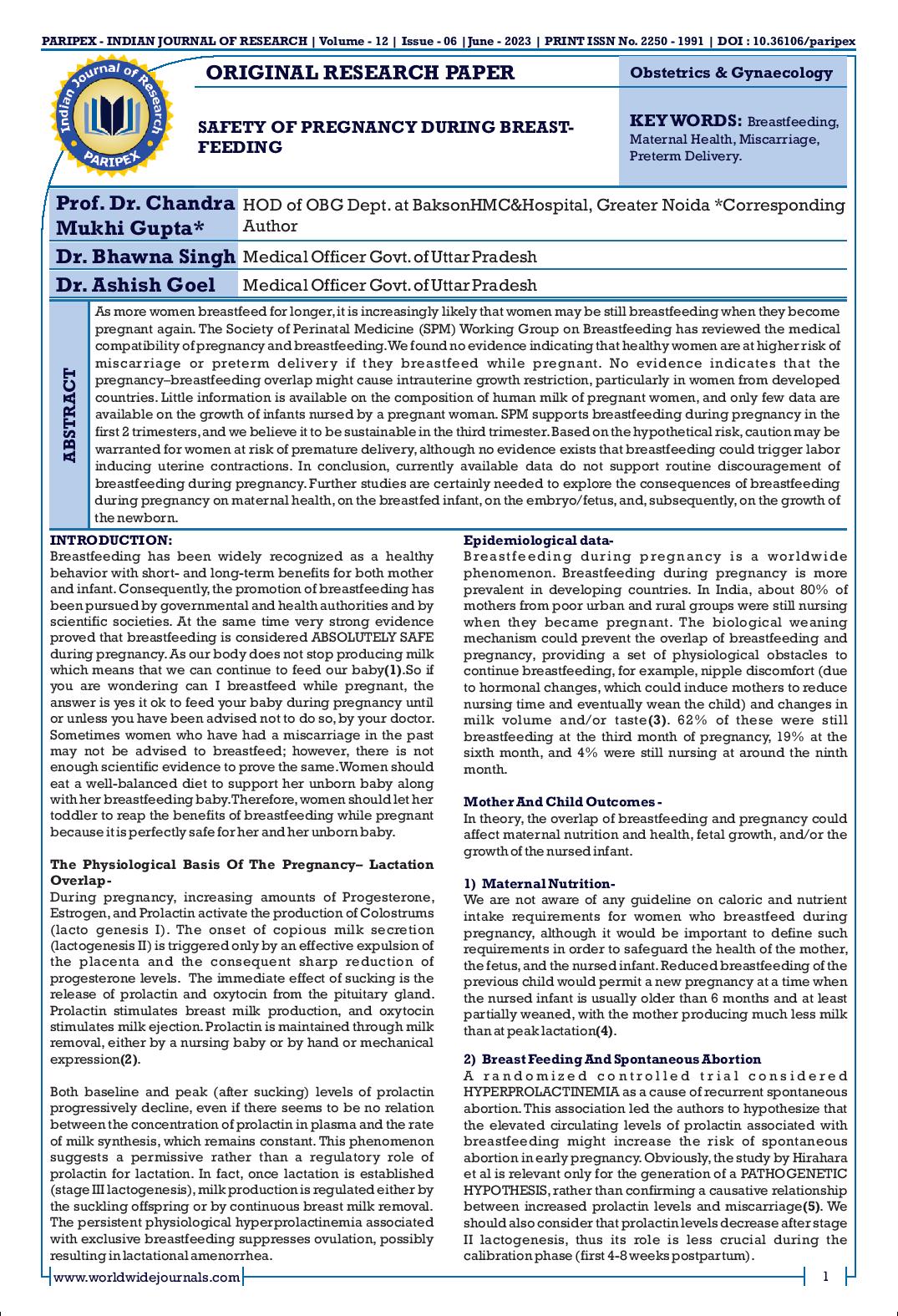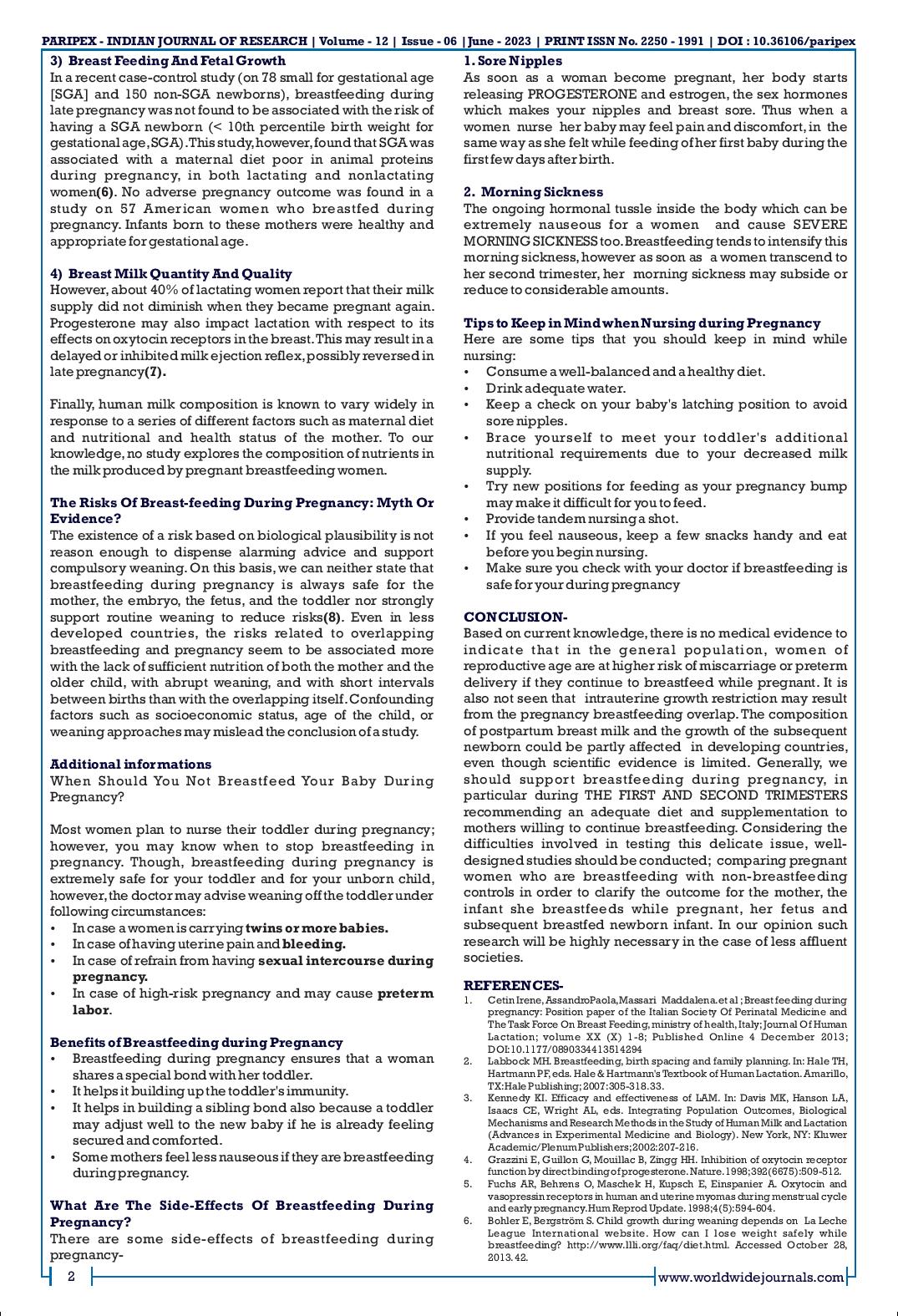SAFETY OF PREGNANCY DURING BREAST- FEEDING
Researches
Dr. Ashish Goel Medical Officer Govt.of Uttar Pradesh, Prof. Dr. Chandra Mukhi Gupta* HOD of OBG Dept. at BaksonHMC&Hospital, Greater Noida *Corresponding Author Dr. Bhawna Singh Medical Officer Govt.of Uttar Pradesh
INTRODUCTION: Breastfeeding has been widely recognized as a healthy behavior with short- and long-term benefits for both mother and infant.Consequently,the promotion of breastfeeding has been pursued by governmental and health authorities and by scientific societies. At the same time very strong evidence proved that breastfeeding is considered ABSOLUTELY SAFE during pregnancy.As our body does not stop producing milk which means that we can continue to feed our baby(1).So if you are wondering can I breastfeed while pregnant, the answer is yes it ok to feed your baby during pregnancy until or unless you have been advised not to do so,by your doctor. Sometimes women who have had a miscarriage in the past may not be advised to breastfeed; however, there is not enough scientific evidence to prove the same.Women should eat a well-balanced diet to support her unborn baby along with her breastfeeding baby.Therefore,women should let her toddler to reap the benefits of breastfeeding while pregnant because it is perfectly safe for her and her unborn baby. The Physiological Basis Of The Pregnancy– Lactation Overlap - During pregnancy, increasing amounts of Progesterone, Estrogen,and Prolactin activate the production of Colostrums (lacto genesis I). The onset of copious milk secretion (lactogenesis II) is triggered only by an effective expulsion of the placenta and the consequent sharp reduction of progesterone levels. The immediate effect of sucking is the release of prolactin and oxytocin from the pituitary gland. Prolactin stimulates breast milk production, and oxytocin stimulates milk ejection.Prolactin is maintained through milk removal, either by a nursing baby or by hand or mechanical expression(2). Both baseline and peak (after sucking) levels of prolactin progressively decline, even if there seems to be no relation between the concentration of prolactin in plasma and the rate of milk synthesis, which remains constant. This phenomenon suggests a permissive rather than a regulatory role of prolactin for lactation. In fact, once lactation is established (stage III lactogenesis),milk production is regulated either by the suckling offspring or by continuous breast milk removal. The persistent physiological hyperprolactinemia associated with exclusive breastfeeding suppresses ovulation, possibly resulting in lactational amenorrhea. Epidemiological dataBreastfeeding dur ing pregnancy is a worldwide phenomenon. Breastfeeding during pregnancy is more prevalent in developing countries. In India, about 80% of mothers from poor urban and rural groups were still nursing when they became pregnant. The biological weaning mechanism could prevent the overlap of breastfeeding and pregnancy, providing a set of physiological obstacles to continue breastfeeding, for example, nipple discomfort (due to hormonal changes, which could induce mothers to reduce nursing time and eventually wean the child) and changes in milk volume and/or taste(3). 62% of these were still breastfeeding at the third month of pregnancy, 19% at the sixth month, and 4% were still nursing at around the ninth month. Mother And Child Outcomes - In theory, the overlap of breastfeeding and pregnancy could affect maternal nutrition and health, fetal growth, and/or the growth of the nursed infant. 1) Maternal NutritionWe are not aware of any guideline on caloric and nutrient intake requirements for women who breastfeed during pregnancy, although it would be important to define such requirements in order to safeguard the health of the mother, the fetus,and the nursed infant.Reduced breastfeeding of the previous child would permit a new pregnancy at a time when the nursed infant is usually older than 6 months and at least partially weaned, with the mother producing much less milk than at peak lactation(4). 2) Breast Feeding And Spontaneous Abortion A r a n d o m i z e d c o n t r o l l e d t r i a l c o n s i d e r e d HYPERPROLACTINEMIA as a cause of recurrent spontaneous abortion.This association led the authors to hypothesize that the elevated circulating levels of prolactin associated with breastfeeding might increase the risk of spontaneous abortion in early pregnancy.Obviously,the study by Hirahara et al is relevant only for the generation of a PATHOGENETIC HYPOTHESIS, rather than confirming a causative relationship between increased prolactin levels and miscarriage(5). We should also consider that prolactin levels decrease after stage II lactogenesis, thus its role is less crucial during the calibration phase (first 4-8 weeks postpartum). PARIPEX - INDIAN JOURNAL OF RESEARCH | Volume - 12 | Issue - 06 |June - 2023 | PRINT ISSN No. 2250 - 1991 | DOI : 10.36106/paripex 2 www.worldwidejournals.com 3) Breast Feeding And Fetal Growth In a recent case-control study (on 78 small for gestational age [SGA] and 150 non-SGA newborns), breastfeeding during late pregnancy was not found to be associated with the risk of having a SGA newborn (< 10th percentile birth weight for gestational age,SGA).This study,however,found that SGA was associated with a maternal diet poor in animal proteins during pregnancy, in both lactating and nonlactating women(6). No adverse pregnancy outcome was found in a study on 57 American women who breastfed during pregnancy. Infants born to these mothers were healthy and appropriate for gestational age. 4) Breast Milk Quantity And Quality However,about 40% of lactating women report that their milk supply did not diminish when they became pregnant again. Progesterone may also impact lactation with respect to its effects on oxytocin receptors in the breast.This may result in a delayed or inhibited milk ejection reflex,possibly reversed in late pregnancy(7). Finally, human milk composition is known to vary widely in response to a series of different factors such as maternal diet and nutritional and health status of the mother. To our knowledge,no study explores the composition of nutrients in the milk produced by pregnant breastfeeding women. The Risks Of Breast-feeding During Pregnancy:Myth Or Evidence? The existence of a risk based on biological plausibility is not reason enough to dispense alarming advice and support compulsory weaning. On this basis, we can neither state that breastfeeding during pregnancy is always safe for the mother, the embryo, the fetus, and the toddler nor strongly support routine weaning to reduce risks(8). Even in less developed countries, the risks related to overlapping breastfeeding and pregnancy seem to be associated more with the lack of sufficient nutrition of both the mother and the older child, with abrupt weaning, and with short intervals between births than with the overlapping itself.Confounding factors such as socioeconomic status, age of the child, or weaning approaches may mislead the conclusion of a study. Additional informations When Should You Not Breastfeed Your Baby During Pregnancy? Most women plan to nurse their toddler during pregnancy; however, you may know when to stop breastfeeding in pregnancy. Though, breastfeeding during pregnancy is extremely safe for your toddler and for your unborn child, however,the doctor may advise weaning off the toddler under following circumstances: Ÿ In case a women is carryingtwins or more babies. Ÿ In case of having uterine pain andbleeding. Ÿ In case of refrain from having sexual intercourse during pregnancy. Ÿ In case of high-risk pregnancy and may cause preterm labor. Benefits of Breastfeeding during Pregnancy Ÿ Breastfeeding during pregnancy ensures that a woman shares a special bond with her toddler. Ÿ It helps it building up the toddler's immunity. Ÿ It helps in building a sibling bond also because a toddler may adjust well to the new baby if he is already feeling secured and comforted. Ÿ Some mothers feel less nauseous if they are breastfeeding during pregnancy. What Are The Side-Effects Of Breastfeeding During Pregnancy? There are some side-effects of breastfeeding during pregnancy1.Sore Nipples As soon as a woman become pregnant, her body starts releasing PROGESTERONE and estrogen, the sex hormones which makes your nipples and breast sore. Thus when a women nurse her baby may feel pain and discomfort,in the same way as she felt while feeding of her first baby during the first few days after birth. 2. Morning Sickness The ongoing hormonal tussle inside the body which can be extremely nauseous for a women and cause SEVERE MORNING SICKNESS too.Breastfeeding tends to intensify this morning sickness,however as soon as a women transcend to her second trimester, her morning sickness may subside or reduce to considerable amounts. Tips to Keep in Mind when Nursing during Pregnancy Here are some tips that you should keep in mind while nursing: Ÿ Consume a well-balanced and a healthy diet. Ÿ Drink adequate water. Ÿ Keep a check on your baby's latching position to avoid sore nipples. Ÿ Brace yourself to meet your toddler's additional nutritional requirements due to your decreased milk supply. Ÿ Try new positions for feeding as your pregnancy bump may make it difficult for you to feed. Ÿ Provide tandem nursing a shot. Ÿ If you feel nauseous, keep a few snacks handy and eat before you begin nursing. Ÿ Make sure you check with your doctor if breastfeeding is safe for your during pregnancy CONCLUSIONBased on current knowledge,there is no medical evidence to indicate that in the general population, women of reproductive age are at higher risk of miscarriage or preterm delivery if they continue to breastfeed while pregnant. It is also not seen that intrauterine growth restriction may result from the pregnancy breastfeeding overlap. The composition of postpartum breast milk and the growth of the subsequent newborn could be partly affected in developing countries, even though scientific evidence is limited. Generally, we should support breastfeeding during pregnancy, in particular during THE FIRST AND SECOND TRIMESTERS recommending an adequate diet and supplementation to mothers willing to continue breastfeeding. Considering the difficulties involved in testing this delicate issue, welldesigned studies should be conducted; comparing pregnant women who are breastfeeding with non-breastfeeding controls in order to clarify the outcome for the mother, the infant she breastfeeds while pregnant, her fetus and subsequent breastfed newborn infant. In our opinion such research will be highly necessary in the case of less affluent societies. REFERENCES1. Cetin Irene,AssandroPaola,Massari Maddalena.et al ;Breast feeding during pregnancy: Position paper of the Italian Society Of Perinatal Medicine and The Task Force On Breast Feeding,ministry of health,Italy;Journal Of Human Lactation; volume XX (X) 1-8; Published Online 4 December 2013; DOI:10.1177/0890334413514294 2. Labbock MH. Breastfeeding, birth spacing and family planning. In: Hale TH, Hartmann PF,eds.Hale & Hartmann's Textbook of Human Lactation.Amarillo, TX:Hale Publishing;2007:305-318.33. 3. Kennedy KI. Efficacy and effectiveness of LAM. In: Davis MK, Hanson LA, Isaacs CE, Wright AL, eds. Integrating Population Outcomes, Biological Mechanisms and Research Methods in the Study of Human Milk and Lactation (Advances in Experimental Medicine and Biology). New York, NY: Kluwer Academic/Plenum Publishers;2002:207-216. 4. Grazzini E, Guillon G, Mouillac B, Zingg HH. Inhibition of oxytocin receptor function by direct binding of progesterone.Nature.1998;392(6675):509-512. 5. Fuchs AR, Behrens O, Maschek H, Kupsch E, Einspanier A. Oxytocin and vasopressin receptors in human and uterine myomas during menstrual cycle and early pregnancy.Hum Reprod Update.1998;4(5):594-604. 6. Bohler E, Bergström S. Child growth during weaning depends on La Leche League International website. How can I lose weight safely while breastfeeding? http://www.llli.org/faq/diet.html. Accessed October 28, 2013.42. PARIPEX - INDIAN JOURNAL OF RESEARCH | Volume - 12 | Issue - 06 |June - 2023 | PRINT ISSN No. 2250 - 1991 | DOI : 10.36106/paripex www.worldwidejournals.com 3 7. Verd S, Moll J. Miscarriage rate in pregnancy-breastfeeding overlap. Contraception. 2008;78(4):346-349. 43. Ishii H. Does breastfeeding induce spontaneous abortion? J ObstetGynaecol Res. 2009;35(5):864-868whether mother is pregnant again.J Trop Pediatr.1996;42(2):104-109. 8. Remond B, Ollier A, Miranda G. Milking of cows in late pregnancy: milk production during this period and during the succeeding lactation. J Dairy Res.1992;59(3):233-241


